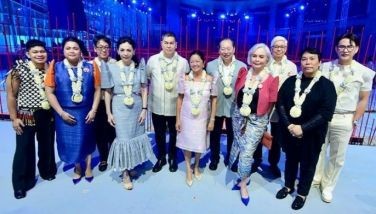Being competitive

Fear of competition. That’s what dragged our country’s economy from second only to Japan to the bottom of the pit over the last 70 or so years. Filipino First was the earliest post WW2 incarnation of our national inferiority complex.
The ruling elite took advantage of this fear. When the elite started putting up manufacturing facilities, they successfully convinced our politicians that they deserve protection because they were “baby” industries.
They didn’t use the period of protectionism to invest enough in their facilities to become internationally competitive. They were satisfied with the local market, because the protection from imported competitors enabled them to price their products high even as the quality remained low.
Protectionism led to rent-seeking because the government was the dispenser of favors. We had a thriving unholy alliance of so-called local industrialists and politicians. Rent-seeking favors were paid for and the industrial elite and the political leadership lived off the fat of the land.
In the meantime, war-torn South Korea started building its industrial might. There was corruption too and an unholy alliance between the South Korean elites who formed their chaebols and the politicians. The difference was, they didn’t lose their national focus: that they must build up their country’s economy. That they did rather quickly.
Two decades later, another war-torn country, Vietnam, decided it will rise from the ashes of a brutal war. The Vietnamese never lost their sense of national purpose. No wonder we are now eating their dust.
But let us not go far. The Filipino-Chinese community is a good example of how to take advantage of challenges. The forebears of the current generation arrived here very poor. Our Filipino First rules discriminated against them. But they just tried harder and harder. Now their children and grandchildren are leading some of our top conglomerates. Unfortunately, they have adopted too well to our culture of rent-seeking and have become part of the problem.
I have visited each one of the original ASEAN countries back in 1969 and saw how much ahead we were. Yes, all of them, including Singapore. But corruption, our fear of competition and our inability to have a sense of national purpose and common good eventually left us by the wayside.
Hangang dito na lang ba tayo? Will we forever be afraid of competition? Is isolating ourselves from the international economy our idea of achieving progress?
Credit President Marcos for bravely deciding that we must now bite the bullet, so to speak, and be world competitive by joining RCEP. We are the last of the present 14-member Asia-Pacific free trade grouping to ratify the agreement. The others are Australia, Brunei, Cambodia, China, Indonesia, Japan, South Korea, Laos, Malaysia, New Zealand, Singapore, Thailand, and Vietnam.
RCEP or the Regional Comprehensive Economic Partnership was conceived at the 2011 ASEAN summit in Bali, Indonesia. It aims to abolish 90 percent of tariffs on trade among partners within 20 years. It could become the world’s largest trade bloc covering 2.2 billion people, 30 percent of the world population, a mixed group of high-, middle-, and low-income economies. We risk losing out on being part of global supply chains if we stay out of RCEP.
Why are so many local groups afraid of RCEP? Simply because no one wants to get out of their comfort zones. Fear of competition… that we will be eaten up by our trading partners. That may well happen anyway even if we didn’t join RCEP. At least by joining, we will be forced to swim.
Right now, our economy is already so import dependent. The Philippines buys more from each RCEP partner than it sells to them. We suffer a trade deficit with each partner, including Cambodia.
RCEP participating countries are among the Philippines’ top export destinations and import suppliers. From 2012 to 2020, the RCEP participating countries are among the Philippines’ top sources of net foreign direct investments, averaging 43 percent. In the same period, the bulk of the country’s trade deficit was with RCEP participating countries.
But joining RCEP provides potential investors predictable and uniform rules for trade and investment. Economist Romeo Bernardo noted that the RCEP’s immediate value to the Philippines lies “not in the incremental tariff reductions, which may take up to 20 years to implement, but in the promise of seamless production networks among the members who will be tied to common standards, disciplines on intellectual property, rules of origin, customs processes, e-commerce, and competition policy.”
RCEP can generate more employment opportunities for Filipino service providers, an economic area we are good at. The opportunities include professional and management services, accounting and legal services, auditing, architecture, game development, telecommunications, and transport.
We have recently enacted laws to increase investments in the country, such as the Foreign Investment Act, Retail Trade Liberalization Law, and the Amended Public Service Act. RCEP will enable us to realize the objectives of those investment incentives laws.
The single rule-of-origin framework will help enhance and accelerate participating countries’ activities in global value chains to facilitate foreign direct investments. RCEP also creates a conducive environment for liberalizing services and digital transformation in areas such as e-commerce and telecommunications.
The noisiest protests are from those who claim to represent the agricultural sector. But do they represent the farmers or the agricultural cartels who are threatened by the loss of privileges?
In any case the Department of Trade and Industry (DTI) has pointed out that our schedule of commitments excludes our major agriculture products, thus keeping our local farmers protected. Senate President Zubiri noted that the RCEP only opens up the market for 33 agricultural tariff lines equivalent to only 15 products, most of which pose little to no threat to local produce.
The agriculture sector’s lack of competitiveness today is more because of the protectionist and heavy-handed approach of the government in regulating agriculture over the years. Turning the situation around, the Foundation for Economic Freedom points out, requires the reintroduction of free market principles, starting with freeing up the land market to allow greater consolidation and achievement of scaled economies in our agricultural production systems.
We should be equal to the challenge.
Boo Chanco’s email address is [email protected]. Follow him on Twitter @boochanco.
- Latest
- Trending






























